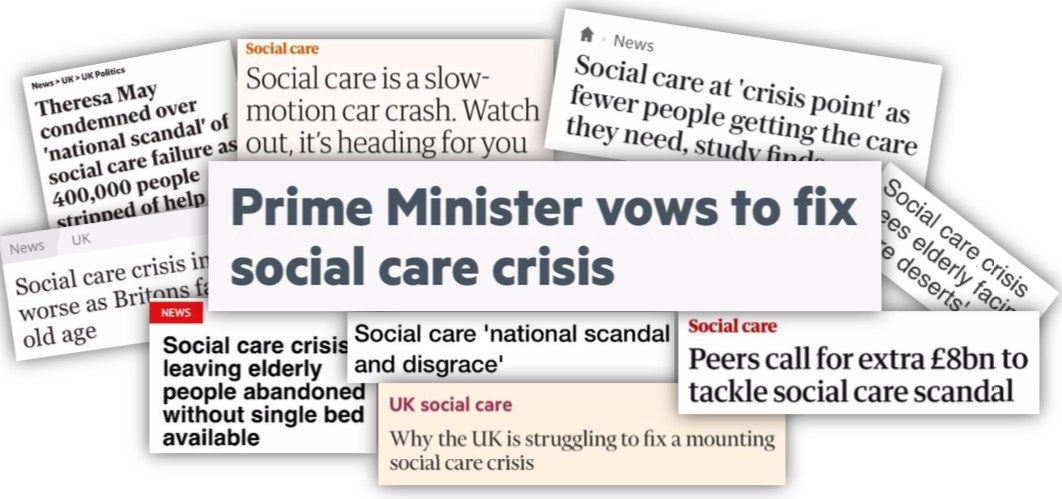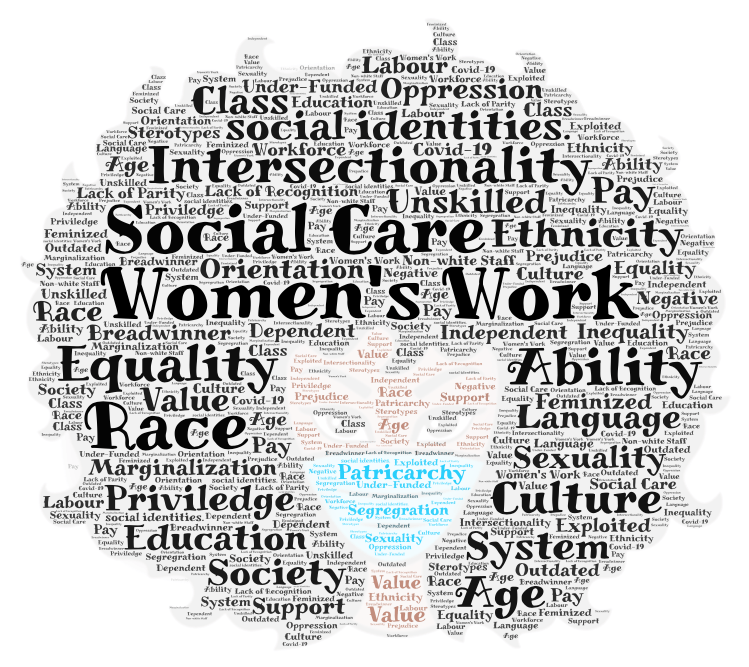Blog

This series of blogs will explain what coproduction is, what Coproduce Care plans to do and to explore good examples of coproduction. In blog 1 we aimed to define coproduction, blog 2 aimed to give a taster of some good moves being made by organisations to promote coproduction. Blog 3 provided a starter coproduction reading list. This, the last of our series of introductory blogs, will set out a list of the most important topics for Coproduce Care to focus on in widening the care debate.

These series of blogs will explain what coproduction is, what Coproduce Care plans to do and to explore good examples of coproduction. In blog 1 we aimed to define coproduction, blog 2 aimed to give a taster of some good moves being made by organisations to promote coproduction. This blog will provide a reading list for the ‘coproductive curious’.

We are pleased to provide an update our involvement in new projects currently being undertaken by Coproduce Care (CIC) in collaboration with Care and Support West. We will be contributing to local initiatives in Social Care Workforce Redesign, and we are excited to share the project with you. This project is running from June 2023 to June 2024. We will be working on three areas for the next 10 months all in the BNSSG region which are as follows: 1: Investigation of the Trusted Assessor Approach in Health and Social Care Systems In this project, we are investigating the Trusted Assessor Approach in health and social care systems. The objective is to demonstrate the value of Trusted Assessors in streamlining care needs assessment, while also addressing data protection and consent concerns. Case studies will be created from local regions that have implemented this approach, to provide insights into the benefits of Trusted Assessors of reducing delays in accessing required care. 2: BNSSG Opportunities for Levy Sharing and Increasing Apprenticeships in Social Care This project aims to identify opportunities for levy sharing in social care and increase the use of apprenticeships. The project will engage social care providers, training organizations, authorities, and other stakeholders to develop strategies, guidelines, and an implementation plan for utilizing the levy effectively and increasing the use of apprenticeships. 3: Integrated Health and Social Care: Enhancing Collaboration, Improving Quality, Shaping Models of Care, and the Future Social Care Workforce In this project, we are evidencing the enhanced collaboration between social care providers, health services, and local authorities. By mapping existing interfaces and collaborations, we seek to identify opportunities for cross-system benefits and improved outcomes, creating recommendations for integration for BNSSG. Our research will provide valuable insights to integration and collaboration between social care and health. At Coproduce Care (CIC), we believe that collaboration and innovation are vital for transforming social care. Through these projects, we aim to contribute to a more efficient and compassionate system. We extend our gratitude to all stakeholders, providers, commissioners, and policymakers for their invaluable support. Thank you for your continued interest in our endeavours. We will keep you updated as the projects progresses! In the meantime, if you are doing any work in any of these key areas, please get in touch with us using the below form. Thank you!

Dear Thérèse Coffey, We wish you the best of luck on your appointment as Secretary of State for Health and Social Care. Coproduce Care (CIC) is a non-profit organisation set up to democratise the social care debate. We support the voices of those working and involved in social care to influence wider decision making in the sector. Through our continued work in this area, we are writing to address some of the urgent needs of our social care workforce. We welcome your plans to set out ‘ Our plans for patients ’ to ensure our population have easier access to NHS and social care services through winter, putting the needs of patients as priority. To ensure we prioritise the health and wellbeing of our populations, and deliver the best, high-quality care possible, we need to ensure we prioritise the needs of our workforce who are at the front of delivering health and social care . To ensure both the health and wellbeing of our population and our social care workforce, we recommend the following: 1. Improving pay for social care workers, in real terms The Kings Fund published a report which compared the pay of social care workers to ten of the largest supermarkets. It found that nine out of ten supermarkets paid more than most social care roles. An example used is that if care worker left their role for a supermarket position at Tesco, they would see a 6.3% pay increase instantly. We have conducted many surveys, webinars, and connected with our audience on what is crucial to improving care workers working conditions and we have found that increasing pay is consistently the most crucial factor in reflecting the value of the work and high stress and responsibilities of the role . With the current cost of living crisis, this need for increasing pay is only getting more urgent. The sector currently has 100,000 vacancies , with extremely high levels of staff shortages. This affects the capacity to deliver services and the quality of care provided . Providers are struggling to recruit staff as they are competing with supermarkets and hospitality, sectors of which offer less stress and responsibility and more pay. We believe care workers are an invaluable part of our society and therefore should be paid accordingly. We recommend: · Introduce national pay scales that ensure care workers meet a real national living wage as a minimum . This will recognise the full contribution of social care workers make to the health of our population, and that their contribution is a real investment into our population. By increasing pay, we further increase recruitment and retention in the sector, and improve the perception of social care being a highly valuable and promising career choice. · Facilitate efforts to develop appropriate distribution of funds. Ensuring the integration and professionalisation of care is fully realised will allow better distribution of funds resulting in higher wages which better reflects the level of skill, qualifications, responsibilities and selflessness required to work within this sector. 2. Professionalising the care system Health and social care should be professionalised to encourage staff retention, career progression and further skill development. Professionalising care work would ensure that those working in the sector are valued and are provided with the necessary tools to provide high quality care. Currently, there is no accredited qualification for social care workers, without a standardised training process. We hosted a live stream with Gillian Keegan , who mentioned the government’s intention to create a voluntary digital care workforce hub, as well as a skill passport for all Health & Social Care workers. This is understood to allow easier identification of the workforce, including the possibility to share resources and opportunities to encourage the workforce to up-skill and develop. The skills passport would help keep track of the skills care workers have demonstrated over time, meaning career progression would be easier to identify . Whilst individual action is very important, to improve the quality of care, we urge for a standardised career and training development program for all care staff that results in an accredited qualification . We recommend: · Adequate pay to restore and recognise social care work as a valued profession . Extensive skills are involved in care work, and if standardised training and qualifications are implemented, security of applicable income is appropriate to these expectations. By increasing pay, care work has higher professional footing as a recognised career and role. · Ensuring the integration of social care is fully realised . The high fragmentation of the care sector and its lack of integration with NHS services makes it challenging to implement standardised training . The governments white paper ‘ Health and social care integration: joining up care for people, places and population ’ seeks the ambition to join up social care services. We welcome this white paper and its integration policy to achieve higher quality of care and better health outcomes. This ambition requires effort and commitment to the integration at all levels, and we hope that as health secretary, fully putting this policy into practice and reaching its scope, goals, and purpose is your focus in your new role. · Implementing standardised training, improved learning outcomes for workers, including IT, literacy, and numeracy training are addressed with sensitivity and with the voices of the workers at heart . Implementing standardised training would ensure a level of professionalism across the sector, however, must go in line with the security of increased income and security of hours of work. We must protect the wellbeing of our workforce, of which is already experiencing burn-out and exhaustion from the high pressures the sector is facing. We cannot have higher expectations of our workers undertaking standardised training without adequate pay . We hope you agree with our recommendations and seek to ensure we continue to improve the working conditions for our social care workforce. We hope that within your post as the new Health and Social Care Secretary, you prioritise the voices of those most impacted by decision making regarding the sector. Thank you for taking the time to read this letter, CoProduce Care Written by: Gabriella Neal

Coproduce Care's Annual Round Up ❗❗ It might not feel like a normal New Year's, but it's still the perfect time to look over some of our favourite moments, from livestreams to the most important findings from our social care research and anything from the other activities our team of volunteers have run this year. Thanks for getting through 2020 with us, and here's to a brighter 2021 🎉🎉

Probably the most important things to us at Co-Produce Care is making sure everyone’s voice is heard fairly. You have the ability to influence laws and government policies. Its normal to feel separated from the decisions our government make, but we want to show that you can make an impact, just like we have (but we are still learning every day too!). We are presenting at The Care Summit (virtually) on Thursday 8th October at 3:10pm – Coproduce Care followers can sign up with a 20% discount here or enter ‘COCARE20’ at checkout. We will be talking through some of the ways we have helped real people coproduce social care along with us, and how easy it is for you to do the same!! 1. Contact your MP One of the most effective ways to raise any concerns or problems you may have is speaking to your local MP (locally elected governmental representatives). You can inform them on what you’re unhappy about and they often can help find a solution to your issue or point you in the right direction at least. But importantly, they can ask questions of the government (frequency changes due to COVID, but they will still ask!) Not sure who your local MP is? On this webpage you will be able to enter your postcode and find your local MP: https://members.parliament.uk/members/Commons. Not sure how to contact your MP, or how to ask for what you need? Here is a governmental guide with all the answers: https://www.parliament.uk/get-involved/contact-an-mp-or-lord/contact-your-mp/. Even if you think they know about the issue, they will always want to speak to more people and know as much as they can, so don’t hold back! 2. DIY: Make a move This is one of the main achievements of Coproduce Care. We speak to, collaborate with, support and share conversations on care via our livestreams, social media channels and website to contribute to amplifying people’s voices. Speaking to those around you can be a useful way to find out if you’re not alone, and if others want to collaborate in raising those issues. We have managed to build a network of around 100 local providers who all join a regular Zoom call to hear updates from authorities and discuss collaborative solutions to the crisis. Once you are doing something, you’ll be amazed who it makes listen!

As part of our #ActForCare campaign we are holding a series of monthly webinars on areas concerning care work. This blog introduces concepts for our first webinar and campaign focus: how care is perceived as ‘Women’s Work’. For more details, please click here to visit our website page dedicated to the campaign. --And click here for our free 'Care as Women's Work' webinar

When we first started Coproduce Care in 2019, we realised that the term was still new to many. So we created a series of blogs aimed at shedding light on coproduction and sharing good practice. We covered: What is Coproduction? Best practice links on How to Coproduce We created a brief Coproduction Reading List (feel free to suggest additions) As well as a list of areas we feel discussions on coproduction need to be had






